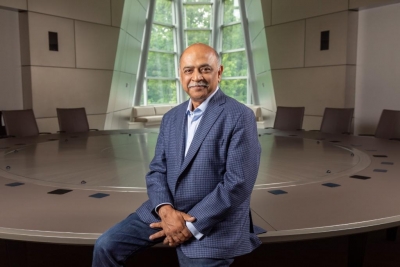By Nishant Arora
New Delhi/Gurugram– From skilling to innovation and hiring new talent, India remains one of the top growth markets for IBM, the company’s Chairman and CEO Arvind Krishna said here on Friday, adding that he is ready to help the Indian government build technology systems at scale and meet its digital transformation goals.
Krishna who met Finance Minister Nirmala Sitharaman, Union Minister of State for IT Rajeev Chandrasekhar and Ashwini Vaishnav, Railways and Telecom Minister, during his India visit this week hailed the ‘PM Gati Shakti’ — a national master plan for multi-modal connectivity — which is a digital platform to bring 16 ministries together for integrated planning and coordinated implementation of infrastructure connectivity projects.
“IBM is here to help the Indian government develop new-age technology systems at scale, especially for the PM Gati Shakti initiative, and meet its digital transformation goals for the country,” Krishna said during a media interaction.
IBM, one of the oldest tech companies, has entered a new digital era in the pandemic with spinoff of its managed infrastructure business as a new entity called Kyndryl, for which India is a big growth market.
“The third quarter (Q3) IBM revenues in Asia did really well and India was a big part of it,” Krishna said, adding that 100 per cent of the company’s CSR activities now go into workforce development and skilling.
“We don’t just drive business value, we drive progress. I believe IBM is uniquely suited to be the catalyst of that progress for decades to come.”
Globally, 70 per cent of IBM’s revenue will now come from software and consulting, higher value businesses that both saw strong growth in Q3 with consulting’s continued acceleration, and two-third of its software business on a recurring revenue basis.
According to the company, the India market revenue will mirror the global trajectory.
India has the highest number of IBMers outside of the US — a key research and innovation hub for the tech giant that set up its first office in the country nearly 26 years back.
Krishna, an alumnus of the Indian Institute of Technology, Kanpur (IIT-K), knows the potential the country has and has gone bullish on India, especially on the R&D and innovation to create for the world.
In the last six months, IBM has expanded in tier 2 cities in India and accelerated its hiring. It also launched state-of-the-art product engineering, innovation and design centres in Kochi, Ahmedabad, Mysuru and Telangana.
In a bid to help enterprises and startups scale their operations in the Hybrid Cloud and AI era, IBM this month announced the opening of its new client innovation centre (CIC) in Mysuru, its eighth in the country.
IBM Consulting now operates from Bengaluru, Chennai, Hyderabad, Kolkata, Mumbai, Delhi-National Capital Region, Pune and Mysuru.
IBM CIC is looking to hire over 10,000 people this quarter globally. The company said that it builds on double-digit hiring growth in its Global Delivery Centres (GDC) already this year.
Krishna said that IBM has taken decisive strategic actions to meet the unique needs of this digital era, including its acquisition of Red Hat in 2019 (for nearly $34 billion) and the spinoff of managed infrastructure services business, now known as Kyndryl.
“Our goal is to break down today’s most common barriers to innovation: closed systems, proprietary technologies, untrustworthy AI, and insufficient security. To do this, we have refocused our company around two primary sources of client value: technology and business expertise,” he elaborated.
IBM has acquired 17 companies since Krishna became the CEO to bolster its hybrid cloud and AI capabilities.
In India, IBM is providing a strong foundation for the IT/ITeS sector in the states with its skilling initiatives.
The company will offer cybersecurity training to 500,000 people in India over the next five years.
Krishna said that IBM is now more strategically focused, more technologically capable, more committed to equity, inclusion and sustainability, and more financially sound.
“We are better able to integrate technology and expertise to solve our clients’ problems, regardless of whether the solutions come from IBM, our business partners, or even our competitors,” he added. (IANS)







